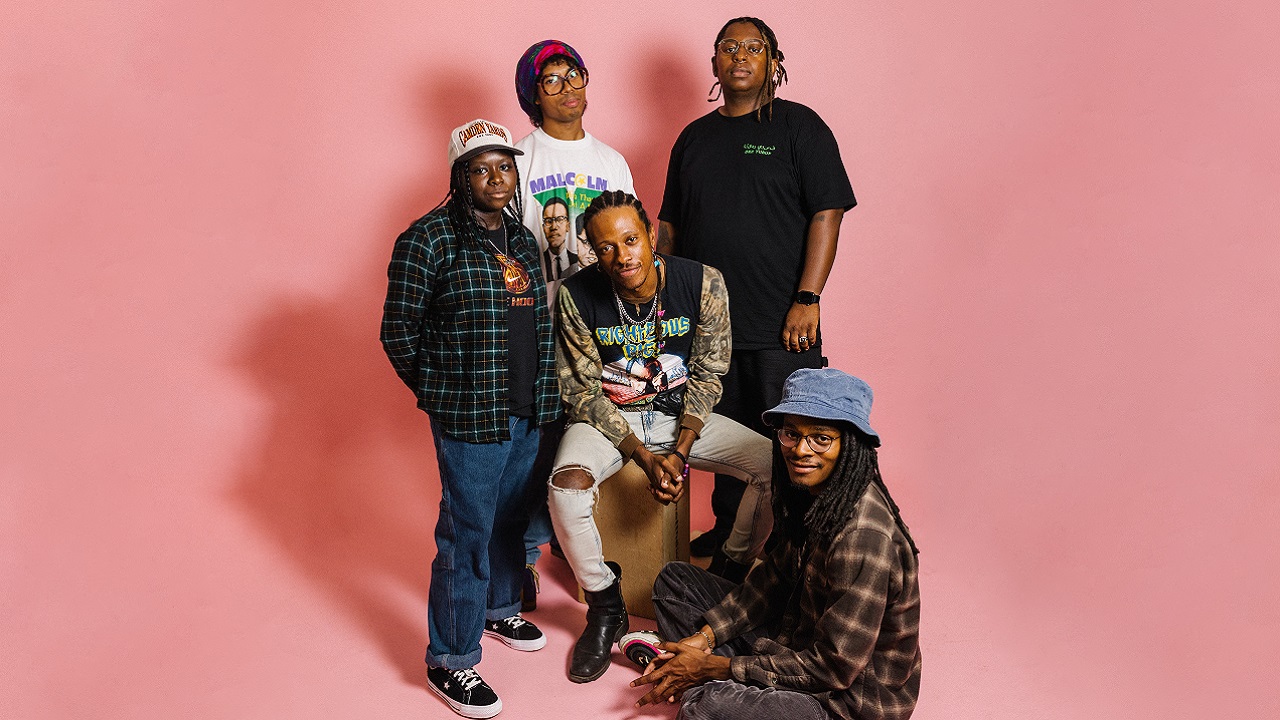
In 2019, Anaiah Rasheed Muhammad had an idea. After 11 years performing in LA indie-rockers The Bots alongside his brother, he would form a hardcore side-project. It would incorporate the music he listened to growing up, making connections between people of the African diaspora. The result? Zulu.
“It’s the sounds of all African-derived music,” explains Anaiah. “We’re talking about jazz, we’re talking about soul. We’re talking about funk, R’n’B, hip hop. And maybe it’s not always the sound, but it’s the essence of the sound and the essence of the band. It’s all due to those folks that made the genres that made it possible for punk to exist. That’s kind of a shortened version of what Zulu is.”
Debut album A New Tomorrow reinvigorates hardcore, offering surprises at every turn. Music To Driveby might be a thunderous plea to end intra-community violence, but it segues into a sample of Curtis Mayfield’s We The People Who Are Darker Than Blue, a song calling for community unity but released in 1970.
Meanwhile, Lyfe Az A Shorty Shun B So Ruff counters desperation and a chugging beatdown with a clip of Nina Simone’s hopeful To Be Young, Gifted And Black from the same era. These voices of encouragement and activism crop up again and again, and throughout the songs there’s a strong thread of defiance and an emphasis on Black joy.
Even the album artwork depicts celebration. At the centre of it all is Créme de Cassis by Alesia Miller & Precious Tucker, a stunning spoken-word piece from guest artists where a dreamy piano part lays the foundation for Alesia’s statements, such as: ‘Discourse around blackness in America / Often orbits around Black pain […] / But I grow weary of repeating our plight / While never highlighting the beauty of us.’
“It was exciting to collaborate with people eager to change the scene like I am,” says Anaiah. “Alesia did such an amazing job writing the poem. There’s frustration, but it’s mainly from a place of love. And that’s why the softer moments work, as well as the heavier moments. I think people usually like to equate hardcore music with anger – and that can be true. There’s a lot of that in the scene. But I tried to go a different route with this record.”
It’s followed by Anaiah’s own take, in the laidback We’re More Than This: ‘I hide my ghetto from the whites not because I’m embarrassed of / they just don’t deserve my essence to use for they character / Then turn around and treat me like I’m the caricature.’
Were there any moments on the record when he wanted to let rip with anger?
“I dip and dive a bit, but I never dwell,” says Anaiah. “It’s a reflection of a reality that I live day in, day out. And only I can speak on that. Anyone else that can relate is unfortunate, but that’s just the reality of it."
Anaiah’s favourite track is the album closer, Who Jah Bless, No One Curse – the title references Bob Marley’s Who The Cap Fit, and the song finishes with a clip of his Small Axe. It opens with a furious hardcore drumbeat and, although the vocals are delivered in vitriolic style, they promise that the people of the diaspora can not only survive, but thrive. In the middle, a beautiful, meandering guitar instrumental takes hold, like someone’s changed the record. If you only listened to this track alone, you would think it was another band entirely.
“Lyrically, the idea of A New Tomorrow is actually encapsulated in that song,” he says. “It’s a new tomorrow for all the people of the diaspora, hopefully to not only unite with love for each other, but for folks from the diaspora to stop hating on one another. I really hope it helps people connect.”
Following in the footsteps of hardcore punk/reggae pioneers Bad Brains, Anaiah’s heartened to see that Zulu are reaching ethnic groups who wouldn’t necessarily know about or feel welcome in the hardcore scene, bolstered by the rise of peers such as Pennsylvania’s Soul Glo.
In the video for Where I’m From, a homage to A Tribe Called Quest’s iconic video for their 1991 song Scenario, Anaiah and his bandmates party alongside Soul Glo’s Pierce Jordan, Obioma Ugonna from Atlanta’s Playytime, comedian Eric André and Fever333’s Jason Aalon Butler – it’s fun and welcoming, inviting everyone to take part.
“Seeing the new people coming into the scene, the true expression that is coming with it… that’s that ‘new tomorrow’. I’m hoping it continues to get better and better,” says Anaiah.
That new tomorrow comes with great ambition and an even greater push for inclusivity. The band have already toured the US with the likes of Show Me The Body, Jesus Piece and Scowl – but Anaiah wants more.
“I want to take this worldwide. That’s the goal. And it’s past just being a band. It’s past me. I have goals for my community, and ways I want to help,” he says. “I want to spread this message, but also get younger kids in the generations to come to shows, get into heavy music. Specifically kids in LA. I want them to understand that there is a place for them in this scene. Our ancestry carved out this genre – without Black culture, hardcore wouldn’t even exist.”
He smiles: “And it would be nice to take things even further, you know? If space travel is ever available. Get on some extra-terrestrial intergalactic type movements!"
A New Tomorrow is out now. Zulu play Download in June.







